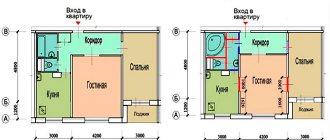- October 24, 2018
- Housing law
- Marina Lobacheva
Privatization is a procedure during which state-owned real estate is transferred to the ownership of private individuals. Most often, the process is carried out in relation to municipal apartments, which citizens use on the basis of a social rent agreement or a warrant. Privatization requires the consent of all registered persons who become participants in this process. If there are minor citizens, then the parents make the decision for them. Refusal from privatization must be formalized, which requires contacting a notary. A person who refuses to participate in this process still retains the right to live in the apartment for life.
Concept
The main condition for the privatization of any real estate is the consent of all registered persons who live in this apartment. If a person simply does not want the housing to be registered in the names of all residents, then it will not be possible to use this method of obtaining ownership of real estate.
Relatively recently, it was possible to divide one object into several shares, which were then privatized separately, but in 2018 partial privatization is prohibited.
Another type of refusal is the preparation of an official and notarized refusal of privatization, after which the citizen does not become a participant in this process, but agrees that the property will be transferred into the ownership of other persons registered in the apartment. In this case, his share is distributed among other persons or transferred to another citizen.
Is it possible to refuse?
Every person has the right to refuse to participate in privatization. It is impossible to force him to participate in this procedure. In this case, the following nuances are taken into account:
- a citizen must be aware that in the future he will not be able to claim ownership of even part of the property;
- refusal of privatization in favor of another person is not allowed, therefore the received share is distributed among all other citizens;
- the procedure requires the preparation of an official document, which is certified by a notary;
- the person retains the right to participate in privatization in the future, but only for other real estate.
The decision should only be voluntary, since if in the future it turns out that pressure was exerted on the citizen, then the agreement on the basis of which the housing is transferred into the ownership of citizens may be declared invalid.
Legal consequences
Before explaining the procedure for issuing a refusal, it is necessary to clarify the legal consequences of such a decision. Since the participants in a privatization transaction, as a rule, include members of the same family, when the refusal is issued, other close persons (for example, a spouse, minor children, etc.) will become the owners. In this case, the legal status of citizens will be determined as follows:
- after making a decision to refuse to participate in privatization, the citizen will retain the right to permanent, unlimited use and residence in residential premises;
- if ownership is registered in the name of only one spouse, the second partner will not be able to demand division of the apartment during the divorce process (although he will retain the right to use and reside);
- refusal of minor citizens to participate in the privatization program is not allowed (this category of persons is given the right to re-participate in a privatization transaction after reaching adulthood).
Also on the topic: How to sue a management company?
Retention of the right to use living space after registration of a refusal from privatization is confirmed by the presence of registration at the place of residence. In this case, forced eviction of a tenant will be possible only in exceptional cases (for example, in case of violation of the rules of residence, damage to property, etc.).
For what reasons do citizens refuse to participate in a privatization transaction?
This decision is a free expression of will; coercion to perform such actions is not allowed. As a rule, there is the following reasoning for making such a decision:
- to simplify the privatization procedure when a citizen has difficulty collecting a complete set of documents (for example, when moving to another region, a number of certificates will have to be collected at the previous place of residence);
- to maintain the opportunity to participate in the privatization of another apartment (if the tenant refuses to participate in privatization, he will be able to re-register rights to another housing allocated from the municipal fund).
When applying for a notarial refusal, there is no need to indicate the reasons for such a decision; the notary is obliged to check only the legal capacity and freedom of expression. Also, the reasons for the decision are not indicated when contacting the municipal body that will draw up the privatization agreement.
Process requirements
Refusal from privatization can be presented in two forms:
- reluctance to register the apartment as the property of registered persons, as a result of which the housing remains municipal;
- official refusal to participate, after which the citizen’s share is distributed among the remaining participants, but refusal in favor of another citizen is not allowed.
The main requirement for the latter case is the need to draw up a written document, which is checked and certified by a notary. After the formation of this document, the citizen will not be able to apply for participation in the procedure, but at the same time can use housing for permanent residence for the rest of his life.
How to apply
The legislation allows for the only option for registering a refusal to participate in a privatization transaction - contacting a notary office. There are no territorial restrictions; such a document can be drawn up and certified in any city and region. The right to draw up a refusal in favor of other persons belongs only to the citizen himself; drawing up this document by power of attorney is not allowed.
Why is it necessary to contact a notary office to certify such a refusal?
The notary is authorized to verify the following facts:
- citizen's legal capacity;
- the applicant’s understanding of the consequences of his actions (the notary is obliged to explain such consequences and indicate the fact of explanation in the text of the document);
- the presence of the right to refuse (the document can only be drawn up by a citizen who has the right to use residential premises on social rent terms);
- the refusal can only be drawn up in favor of other tenants of the apartment; unauthorized persons cannot acquire the right to privatization in this way.
Also on the topic: How to get a larger apartment when a five-story building is demolished under the renovation program in Moscow?
Thus, without the personal presence of the employer, the document cannot be executed. When obtaining notarized consent for the privatization of an apartment, the presence of other tenants is not required; it is enough to provide information about the remaining participants in the privatization transaction.
Is it possible to draw up such a document yourself and submit it to a notary office for certification?
Formally, the law does not establish restrictions on the methods of drawing up a document, since the notary still has to check it for compliance with regulations. However, in practice, filling out the refusal form is carried out by employees of the notary’s office, who know all the nuances of drawing up such documents. Citizens will have to pay additional costs for services to compile the form.
The procedure for drawing up and certifying a refusal is as follows:
- citizens decide who will participate in the privatization transaction and who will formalize the refusal through a notary;
- each employer who decides to refuse must appear in person at the notary’s office;
- a notarized refusal is drawn up and certified separately for each of the “refuseniks”;
- information about the certified refusal is entered into the unified register of notarial actions;
- a certified refusal form is issued to the citizen to present it at the place of request.
Registration of a certified refusal in the register of notarial actions is necessary for the possible emergence of claims when challenging privatization transactions.
To complete a notarized waiver in favor of other persons, you must take with you the following documents:
- original of the applicant's civil passport;
- documents confirming the applicant’s right to use a municipal apartment (social rent agreement, registration data at the place of residence, etc.);
- copies of identification documents of other participants in the privatization program.
The notary checks the submitted documents directly in the presence of the interested person. If the applicant confirms the legality of the right to use the apartment, the refusal is drawn up on a notary form and issued to the citizen.
Note! The law does not provide for the possibility of canceling or canceling a certified refusal. If a citizen changes his decision and wants to become an owner along with other family members, he needs to sign a single application for participation in the privatization transaction on a general basis. In this case, the notarial refusal will lose its legal significance.
Also on the topic: What housing and communal services can you avoid paying for?
Is notarization of the specified document required in favor of other residents if a citizen personally approaches the authorized municipal body and declares his refusal?
Law No. 1541-1 does not provide for such forms of refusal as oral appeal or submission of a written statement without notarization. Thus, a visit to a notary’s office cannot be avoided under any circumstances.
Who can refuse?
Many people who do not want to take ownership of even part of the real estate are wondering whether it is possible to refuse privatization. The procedure can be performed by any person registered and living in the property.
The initiator of privatization is usually the responsible tenant specified in the social tenancy agreement or order. But all people registered in this property have the right to participate in the process. Additionally, they can draw up an official refusal. Children cannot be excluded from the process, so they must participate in privatization, although after reaching 18 years of age they can exercise this right again.
It is important to take into account even those persons who do not temporarily reside in the apartment, but have permanent registration in it.
How to refuse
A distinction must be made between two legal concepts:
- refuse privatization;
- refuse to take part in the privatization process.
These are two completely different actions: in the first case, the citizen consciously and justifiably does not use the right granted to him by the state, and does not allow other citizens registered in the apartment to do so.
For these reasons, the property remains municipal property, and everyone living in it only uses residential square meters.
Such a decision must be formalized by a notary, and as a result, he declares his reluctance to have square meters under the right of private property.
But a citizen can refuse to participate in the privatization process in favor of another person, and in this case nothing prevents other residents from formalizing all rights of ownership and disposal of their existing living space. This citizen retains the right to live in this property for life.
But this action has its own nuance - the refusenik cannot transfer his right to any specific family member, this is prohibited by the Privatization Law, the property is transferred to management in shares of each registered tenant, or a certain agreement is established. And in this case, the refusal is also issued by a notary.
If a refusal is issued for a minor, this decision must be approved by the guardianship and trusteeship authorities, otherwise it will not have legal force.
Consequences of refusing privatization
If a person does not want to participate in this process, then he must evaluate the consequences of such a decision. These include:
- a citizen can live in real estate for life, so even the owners will not be able to force him out of the apartment;
- in addition to drawing up an official refusal, he must agree that the property be registered in the name of all registered persons;
- in the future, a citizen will not be able to claim to become the owner of even part of this object;
- he will not have the right to sell, exchange or donate real estate;
- he will not be able to leave even part of the apartment to his heirs after death;
- The citizen retains the right to privatize other real estate.
The consequences of refusing to privatize an apartment are considered mainly positive for the immediate person who does not want to become the owner of the property.
Consequences of failure
It is necessary to distinguish between disagreement with the transfer of housing into ownership and refusal of privatization. The first means that the tenant is against the privatization of real estate.
Since such privatization is possible only with the consent of all residents, in this case the transfer of ownership of housing will not take place.
The second means that the tenant does not object to the privatization of the home, but does not claim the right to own it.
The main consequences for a tenant who refuses privatization are as follows:
- this privatized home does not become his property;
- the tenant's share is divided equally between other privatization participants;
- the tenant can participate in the privatization of other housing;
- can participate in various government programs to provide the population with housing;
- the tenant receives the right to live in this apartment for the rest of his life, even if its owner changes.
During privatization, it is assumed that the property becomes shared, and each of the privatization participants will receive an equal share of this property. If one of the residents refuses to privatize, the share of ownership of each of the remaining residents increases accordingly.
In the event that all tenants except one refuse privatization, then the property completely passes to this remaining tenant. Residents who refuse to privatize an apartment retain the right to live in this apartment for life. It is impossible to write them out from there even in court.
This right is retained by such residents even if the owner of the home changes.
That is, this right remains with them when selling, donating or inheriting an apartment.
Can a child refuse?
Before privatization, it is necessary to obtain the consent of all registered persons. This includes not only adult citizens, but also children. All decisions are made for them by official representatives, who are usually parents. Refusal of privatization in favor of another person is not allowed, and children are mandatory participants in this process.
Children must necessarily receive some part of the apartment, after which they become the owners of this share. However, they can re-participate in the privatization process of other real estate after they turn 18 years old. Parents cannot write a waiver for their children to participate in this process.
How is it processed?
If a person is interested in how to refuse privatization, then he needs to contact a notary, since the official refusal is issued only in writing and must also be certified by a notary. Therefore, to refuse, the following steps are performed:
- The corresponding document is drawn up in written form.
- This document is submitted to the notary for examination and certification.
- Correctly compiled documentation is attached to other papers that are transferred to the privatization center.
When signing an agreement to transfer ownership of an apartment to the residents, this document is not required. This is due to the fact that all persons who wrote an official refusal are excluded from participation in this process already at the stage of consideration of the received papers.
A sample refusal of privatization can be studied below.
What information is included?
When drawing up such an application, the following information must be indicated:
- passport details of the citizen refusing to participate in privatization;
- address of the apartment in respect of which the process is being carried out;
- the reason for the refusal;
- consent to the privatization of real estate by other persons registered in the apartment.
Simultaneously with the refusal of privatization, consent is drawn up for this process to be carried out by other citizens who have the appropriate powers and rights.
Content
- Privatization
- Ways to refuse a share in a privatized apartment
- The procedure for renouncing a share in a privatized apartment by drawing up a gift agreement
- Procedure for refusing to participate in privatization
- Consequences of refusing a share in a privatized apartment
- The most popular question and answer regarding giving up a share in a privatized apartment
- An example of renouncing a share in a privatized apartment
- Conclusion
- Samples of applications and forms
- List of laws
Duration and cost
The procedure for drawing up a document does not take more than one day, and 800 rubles are usually paid for this.
Direct privatization takes about two months. If any errors are found in the documents, the procedure may be delayed. In this case, citizens will have to prepare the necessary papers or make changes to any documents.
People who are participants in privatization must register ownership of the apartment. To do this, they pay a state duty in the amount of 2 thousand rubles. Refusal to transfer the apartment into the ownership of the residents may be due to the fact that the apartment is located in a dilapidated building or is not subject to privatization for other reasons.
Is it possible to withdraw an application?
Refusal from privatization is possible only on a voluntary basis, therefore, if a citizen decides to withdraw a previously written application, then there must be good reasons for this. You can revoke a document if a person changes his mind or his financial situation worsens, so he expects to receive some part of the real estate as his own.
You can withdraw an application only in a situation where the right of ownership of the housing has not yet been formalized by other participants in the process. Under such conditions, the procedure stops, and after that you will have to collect the necessary documentation again.
Is it possible to challenge?
If a person was forced to draw up a refusal, then he can challenge the privatization. The procedure can be performed with the help of a notary or in court. At the same time, it is important to have evidence that the privatization was actually carried out in violation of the requirements of the law or the rights of the registered person.
If the court takes the plaintiff’s side, then the agreement on the basis of which the apartment was transferred into the ownership of the applicants is declared invalid. Most often, claims are satisfied if the citizen can prove that he refused to participate in the process due to threats or blackmail.
Rights and obligations of the person who refuses
How to refuse privatization after privatization of an apartment? If all participants in the process have registered ownership, then it will not be possible to refuse to participate in privatization.
A citizen who has written an official refusal is entitled to the following rights:
- You can live in real estate for the rest of your life, and this right remains intact even if the owner of the apartment changes.
- A citizen may use common property, which includes the land plot where the building, stairs, elevators or other similar structures are located.
- If a person renounces his share, which was privatized by him, for which he draws up a gift agreement, transferring the property to another citizen registered in the apartment, then the deed of gift should indicate the opportunity to live in the property for the rest of his life.
- Other apartment owners cannot force this person out of the property, even in a situation where the citizen is declared incompetent.
But in addition to rights, a citizen is endowed with certain responsibilities. These include:
- the person is further obliged to pay for utilities;
- the living space must be maintained in optimal habitable condition and must not be deliberately destroyed;
- Residents must respect the rights and interests of other registered citizens, and also take into account the rules for the use of residential premises.
The final refusal to privatize housing cannot be changed or cancelled. It is impossible to challenge it without compelling reasons, so every person must approach such a decision responsibly. The procedure involves contacting a notary, and the specialist will definitely notify the client about what consequences of the decision he will have to face in the future.
If I refused privatization, is it possible to restore it?
- Preparation of an application for deprivatization.
- Transfer of documents to the local administration.
- Waiting for a response from the municipality.
- Signing an agreement to return the apartment back to the state.
- Making changes to Rosreestr.
- Concluding a new rental agreement for residential premises.
Pensioner Solovyova and her husband lived in a municipal apartment under a social tenancy agreement. Subsequently, the residents applied for privatization of housing and registered ownership of the apartment. 2 years later, Solovyova’s husband died. The woman was left alone, since the children had long grown up and lived in other cities.
Solovyova’s pension was barely enough to pay annual taxes, utilities and major repairs. The woman decided to cancel the privatization and submitted documents to the local Housing Department. Reason: death of a spouse and difficult financial situation; inability to bear expenses for a privatized apartment. The application was considered and soon granted.
The housing passed from Solovyova’s property back into the hands of the municipality. The pensioner entered into a rental agreement for an apartment and began to live in it under the same conditions. Housing costs have dropped significantly.
Is it possible to cancel a refusal to privatize?
However, after some time, the situation may change dramatically and you may regret the earlier refusal.
It is then that the question arises: how can the refusal to privatization be annulled and can this be done in principle? It is worth noting that such cases are resolved only in court, taking into account all the circumstances of the case, as well as the facts presented.
It is simply impossible to predict court decisions in advance without thoroughly understanding the claim brought. However, it is still possible to cancel the refusal, especially if you prove the illegality of the actions of the residents or the owner of the apartment.
Yes, you can. Even if you at one time refused to participate in the privatization of an apartment, house or room, this does not mean that you have lost your rights to property irretrievably.
There are situations when a tenant registered in an apartment, for one reason or another, cedes his rights, donating a share in the property in favor of another tenant.
Also, you could simply refuse privatization by writing a corresponding statement certified by a notary.
Refusal from privatization: procedure and consequences
Before writing a corresponding application, a citizen must understand what it entails. First of all, it is worth noting that the refusal is carried out only in favor of other future owners. The share is distributed between them equally.
It is impossible to refuse privatization in favor of one person if there are more than two registered citizens. The transfer of one's share does not deprive the person of the opportunity to register the property in the future. Also, as stated above, refusal does not entail eviction from the apartment.
In addition, if such a citizen is on a waiting list for improved living conditions, he retains the opportunity to receive premises at a discount. Minor citizens, as a general rule, are automatically included in the number of owners.
Exceptions are made in cases provided for by law, when the refusal of persons under 18 years of age is agreed upon and confirmed by the guardianship and guardianship authority.
Often several people are registered in non-privatized apartments, including minors. Many citizens are interested in whether only some of them can receive such housing free of charge. Will those who wrote a refusal to participate in privatization have any legal options? Let's look at this issue in more detail in the article.
Is it possible to return the right to privatization if I signed a refusal?
It is unlikely that your spouse will be able to challenge the privatization.
But he must know that due to the refusal in favor of his mother from privatization, he has an indefinite right to use the specified residential premises and until he voluntarily evicts and is deregistered, no court will be able to recognize him as having lost the right to use the apartment.
As for the residence of children, the place of residence of the children is the place of residence of their parents, that is, as long as he is registered there, no one will deregister the children or evict them. Regarding inheritance. The mother, of course, can draw up a will, but the freedom to testate is limited by the obligatory share, this time.
And secondly, the new owner will be obliged to provide this housing for living. A change of owner does not deprive the spouse of the right to use the privatized residential premises in which he lives as a result of refusal of privatization in favor of his mother. In addition, in the absence of a will, inheritance occurs according to law, and the son is the heir of the first priority.
More to read: Refund when buying a home 13 percent tax deadlines
Several years ago, at the direction of his mother-in-law, my husband signed a waiver of privatization in her favor. That is, she turns out to be the owner of the apartment. And she, her husband, son (my husband) and my husband’s and my minor children are registered. My husband and I live separately from her.
Now the relationship between us is difficult and she constantly threatens that she will leave my husband without an inheritance and that the children should be written out, that she will write a will for another person. She has only one son.
How to be in this case? Is it possible to somehow return the right to privatization to my husband? What can be done in this situation? Please tell me.
Cancellation of apartment privatization
- searching for relevant documents required for transfer to the municipality;
- filing an application requesting deprivatization in favor of the state;
- sending the listed documentation to the local administration and waiting for a response from the municipality;
- drawing up an appropriate agreement on the transfer of privatized housing back to state authorities;
- re-conclusion of a social tenancy agreement for living in an apartment.
- applicants' identification documents;
- title papers for the premises (that is, a certificate from the Unified State Register and a privatization agreement);
- a certificate confirming the absence of restrictions and debts on the apartment;
- application for refusal of housing;
- permission from the PLO to carry out the deprivatization procedure;
- an extract about persons registered at the address;
- a certificate from the tax service certifying payment of property tax.
Why and why they refuse privatization
In the event that all tenants except one refuse privatization, then the property completely passes to this remaining tenant. Residents who refuse to privatize an apartment retain the right to live in this apartment for life. It is impossible to write them out from there even in court.
- this privatized home does not become his property;
- the tenant's share is divided equally between other privatization participants;
- the tenant can participate in the privatization of other housing;
- can participate in various government programs to provide the population with housing;
- the tenant receives the right to live in this apartment for the rest of his life, even if its owner changes.
More to read: Benefits for Minor Mothers
Procedure for refusing privatization
There are two different concepts: a refusal decision and disagreement with the transfer of ownership. If any of the residents does not agree to formalize the rights to the living space, then other citizens will also have problems. To register rights to square meters, all residents must write a consent.
When there are dissenting citizens, the dispute is resolved by the court. When the person who refuses does not agree to undergo the denationalization procedure, then a division of the living space can be carried out. Shares of real estate are distributed among all registered residents.
Separate parts of the living space can be arranged under standard conditions.
- It is impossible to refuse in favor of a specific person. The division of rights is carried out between the participants in the denationalization.
- The procedure is carried out with the approval of all resident citizens. Those who decide to refuse registration must write a refusal.
- One negative decision does not mean that a citizen will continue to be unable to obtain housing rights.
- A citizen can be discharged only by his own decision. Without the approval of a citizen, he cannot be deprived of his right of residence.
- The right to indefinite residence ends when a person is discharged or takes part in registering rights to another living space.
- Those who nevertheless decide to refuse retain the right to be provided with living space from those who are in line.
- It will be difficult to appeal your decision later. To challenge, you will need really compelling reasons. The court will make a positive decision if it can be proven that when drawing up the document the person was not aware of the essence of his actions, i.e. was insane. You can also appeal the decision if the citizen proves that he signed the document not of his own free will, but under pressure.
In what cases can a refusal to participate in privatization be challenged?
1. If the transaction was made by a citizen, although legally capable, but at the time of its completion was in a state where he was not able to understand the meaning of his actions or manage them (see Article 177 of the Civil Code of the Russian Federation).
To establish the above circumstances, within the framework of the trial, it is necessary: a forensic psychiatric examination; provision of certificates from the clinic, extracts from the medical history and other evidence (for example, witness statements).
It should be noted that in accordance with the current housing legislation, a person who refuses to participate in the privatization of an apartment retains the right to use the apartment indefinitely.
Therefore, neither your mother nor subsequent owners will have the right to evict you from the apartment or prevent you from using and living in the apartment.
If, suddenly, these unlawful situations arise, feel free to go to court.










